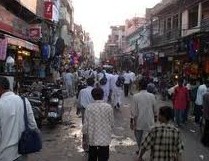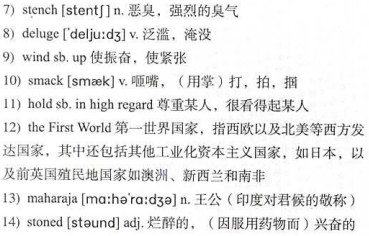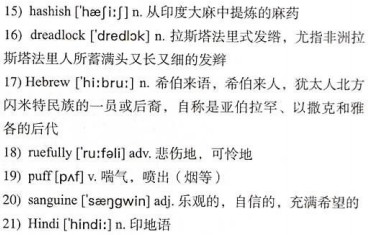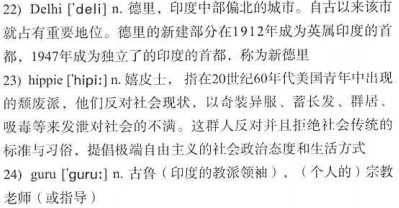很多时候,人,都喜欢带着有色眼睛看人、看事、看某个地域或某个国家。卢梭说过,“人类的真正感情,最不应该让成见给束缚了。”然而,我们最不应该让成见束缚的感情,却常常受困于成见。谁敢说自己没有过以下想法:非洲国家大都贫穷落后,人民愚昧;西方国家就是极乐世界,纸醉金迷;在国外的中国留学生数学一定就能拿A;理工科学生的形象思维没有文科生强……。
要知道父母双全的孩子不一定比孤儿幸福;再富有的人生活得或许不如乞丐快乐;官家的子弟不一定就非得有纨绔的习性;百姓家的子女也可能有奢靡的倾向……,人、事物亦或国家都有它的多面性。因此,凡事仅凭一种印象来下结论,未免太片面,太草率。
完全摒弃 stereotype 并非一件易事,也绝非一蹴而就就可以实现。我们需要兼容并包的胸怀,开朗豁达的性格,以及自我反省的态度。这样我们就可以利用各种机会增加自己认识世界的视角,从而更加接近事物的本质。
文字难度:★★★
I arrived back in 1)Pahar Ganj at 3 pm, six hours after I’d left to go to the jail that morning. The street was already 2)crammed with traffic and so I abandoned my 3)rickshaw and walked back to the hotel. Cars, trucks, rickshaws, 4)mopeds and animals weaved in every conceivable direction to the effect that I had to walk like a 5)puppet on strings; 6)jerking, twisting and hopping my way in an overall forwards direction.
在那天早上我离开伯哈尔根杰去监狱后,我在下午三点又回到那里。路上的交通堵塞不堪,所以我放弃了人力车,步行回旅馆。马路上小汽车、卡车、人力车、机动脚踏两用车和动物朝着各个方向穿行。在这乱局里,我不得不像绳上的木偶一样行走,一会儿疾行,一会儿扭着身子走,一会儿又单脚跳,总体上往前挪动着。
 Smoke, sweat and 7)stench 8)deluged the air and made it seem as though I was walking underwater. As a Westerner, you’re an automatic target on this street, and no one ever gives up on selling you anything. Even when they’ve seen you walk down the street 1000 times before. Often it’s only to 9)wind the foreigner up and get a reaction. If it’s a man they’ll try to sell him something; if a woman then they’ll 10)smack their lips and say “Hey, baby, you like good time?” Just like in the movies.
Smoke, sweat and 7)stench 8)deluged the air and made it seem as though I was walking underwater. As a Westerner, you’re an automatic target on this street, and no one ever gives up on selling you anything. Even when they’ve seen you walk down the street 1000 times before. Often it’s only to 9)wind the foreigner up and get a reaction. If it’s a man they’ll try to sell him something; if a woman then they’ll 10)smack their lips and say “Hey, baby, you like good time?” Just like in the movies.
空气中充斥着烟雾、汗味、恶臭,使得我彷佛是在水下行走。身为西方人,你在这条大街上自然而然就成了一个目标,谁都不会放弃向你推销的机会。即使他们已经看过你在这条道上走了上千次也是如此。他们常常只是想吸引外国人的注意,看看他们的反应是什么。如果对方是个男的,他们会推销点什么;如果是个女的,他们会咂着嘴说:“嗨,宝贝,想寻开心吗?”就像电影里一样。
Friends of mine, who first journeyed to the East the ’60s, told me that we were often 11)held in high regard by the Indians. Like Buddha, we’d left behind our lives of luxury in 12)the First World to come to India in search of truth. They called us “13)maharaja”, great king. However, after years of seeing us crazy, 14)stoned and lost, they eventually saw us for what we were. The “Real Westerners” they saw on TV drove sports cars and lounged by swimming pools. With our cheap clothes, 15)hashish habits and 16)dreadlocks, we were clearly the unwanted scum of our own societies.
我那些早在上世纪六十年代就到东方旅行的朋友告诉我,当时印度人往往很看得起我们。因为我们和佛陀一样,放弃了第一世界的奢侈生活到印度来寻求真理,他们称我们为“maharaja”,意思是大王。可是,多年来看惯了我们疯狂、醉酒、失落的狼狈样子后,他们终于认清了我们的真面目。他们在电视上看到的“真正的西方人”是开着跑车或在游泳池旁休闲的。我们呢,身穿不值钱的衣服,吸大麻,留着拉斯塔法里式发绺。这些都再明显不过地表明,我们是被我们自己的社会抛弃的渣滓。
 Despise, envy or just laugh at us, the Indians certainly don’t understand us. One day I was chatting to a shopkeeper on Pahar Ganj, when an Israeli girl walked past with her friend, chatting to him in 17)Hebrew. The shopkeeper shook his head 18)ruefully.
Despise, envy or just laugh at us, the Indians certainly don’t understand us. One day I was chatting to a shopkeeper on Pahar Ganj, when an Israeli girl walked past with her friend, chatting to him in 17)Hebrew. The shopkeeper shook his head 18)ruefully.
印度人会看不起我们,羡慕我们,或者仅仅是嘲笑我们,可他们肯定不理解我们。有一天,我在伯哈尔根杰与一名店主闲聊。有个以色列女子与朋友经过,两人用希伯来语交谈着。店主怜悯地摇摇头。
“She is a bad woman.”
“How do you know that?”
“I have seen her with three different men.” He told me sternly, as though that said everything.
“Well, where did you see them?”
“In the street!” He 19)puffed.
“她是个坏女人。”
“你怎么知道?”
“我已经看到她与三个不同的男人在一起了。”他用严厉的口吻说,似乎那说明了一切问题。
“呃,你在哪里见到他们?”
“在街上!”他吐出一口烟说道。
I tried in vain to explain that for Westerners, for a woman to be seen in the street with someone didn’t mean she was necessarily sleeping with him. He listened politely, but the look in his eyes suggested that he considered me rather naïve.
我徒劳地尝试向他解释:对于西方人来说,一个女人在街上与男人在一起,并不说明她一定就跟他上床了。他礼貌地听着,但他眼里的神情告诉我,他觉得我太天真了。
When someone first goes to India, they usually have all kinds of notions about “talking with the people” and “immersing in another culture” and so on. All but the most 20)sanguine quickly understands that they will never integrate with Indian society. No matter how good their 21)Hindi gets or what religious vows they take they will always be aliens from outer non-India. In India you are whom you were born as. You cannot become a Hindu, and no amount of eating raw green chilies will change that.
一般人第一次到印度,常会有各种各样如“与当地人交谈”,“深入了解另一种文化”等等的想法。不过,即使是最乐观的人很快就会明白,他们永远无法融入印度社会。不管他们的印地语已经说得多好,或是他们皈依了什么宗教,他们永远都会是印度的外人。在印度,你生来是什么人,就永远是什么人。你永远也不会成为印度人,无论你生吃多少绿辣椒也不会改变这个事实。
But in the end, even though Pahar Ganj was hell, I hung out there for my time in 22)Delhi, as I could at least find conversation with other Westerners, who could relate to where I was coming from. Hell, I might even get some Israeli girl to walk in the street with me.
可不管怎么样,即使伯哈尔根杰是个鬼地方,我在德里停留期间还是在那里混,因为我至少可以与其他西方人说说话,他们可以理解我的感受。管它呢,也许我甚至还会与以色列女孩子在街上逛呢。
Having already spent a couple of years in India, I could easily recognize the tourists, and what kind of trips people were on. There were bearded Italians who thought they were holy men; there were lost, skinny 23)hippies in search of enlightenment, or a 24)guru, or perhaps just clothes that would actually fit them; there were tourists in jeeps, coming back from the Taj Mahal 25)shell-shocked; 26)techno warriors in 27)fluorescent 28)garb; plus other tra-velers and 29)freaks, who couldn’t be as free elsewhere, as they were in India.
在印度呆了几年后,我可以轻而易举地分辨出哪些人是游客,他们以什么样的方式旅行。他们当中有自以为是圣人的蓄须的意大利人;有那些失落而瘦削的嬉皮士,他们来这里寻找启迪,或者寻找一名宗教导师,或者只不过是寻找真正合身的衣服;有些游客坐着吉普车旅行,他们显然被刚刚看过的泰姬陵震住了;有穿着晃眼服装身上携带各种各样最新技术发明的人;加上其他游客,以及一些除了在印度就不会享受到同等自由的狂人。
The longer you stay in India, the more you see, and it’s kind of sad, because it’s better not to perceive some things. The more you understand, the less magical it all seems. Explanations give 30)texture and depth, but they steal away the awe. As such, it’s easy to recognize the newly arrived. They wander around in a nervous state of wonder and 31)appre-hension. The locals see them coming from a mile away, and they pay three times the price for everything for the first few days, which is all they can do to stay afloat in this sea of chaos, noise, and curious brown faces.
你待在印度的时间越长,看到的就越多。那其实很伤感,因为有些事情还是不明白的好。你知道得越多,它的魅力就减少了。解释会带来神韵和深度,但夺去了敬畏。就因为这样,刚到印度的人都很容易就被认出来,他们惊奇而又不安地到处逛,当地人远远就能看见他们。他们开始那几天买东西时付的价钱肯定是原价的三倍。而在这片混乱、吵杂、到处是好奇的棕色面孔的汪洋里,他们也只能这样浮游了。






